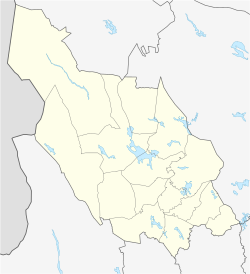Torsång
Torsång | |
|---|---|
 | |
| Coordinates: 60°28′N 15°34′E / 60.467°N 15.567°E | |
| Country | Sweden |
| Province | Dalarna |
| County | Dalarna County |
| Municipality | Borlänge Municipality |
| Area | |
| • Total | 1.08 km2 (0.42 sq mi) |
| Population (31 December 2010)[1] | |
| • Total | 666 |
| • Density | 616/km2 (1,600/sq mi) |
| Time zone | UTC+1 (CET) |
| • Summer (DST) | UTC+2 (CEST) |
Torsång (Swedish pronunciation: [ˈtɔ̂ʂːɔŋ])[2] is a locality situated in Borlänge Municipality, Dalarna County, Sweden with 666 inhabitants in 2010.[1] It is situated on lakes Runnsjön and Osjön and the river Dalälven, which are connected with the canal Lillälven.
Torsång Court District, or Torsångs tingslag, was a district of Dalarna in Sweden. The court district (tingslag) served as the basic division of the rural areas in Dalarna, except for one district that was a hundred (härad). The entire province had once been a single hundred, called Dala hundare.
History
[edit]Swedish (then future) king Gustav I (Gustav Vasa) passed through in the year 1520, while a fugitive from Danish mercenaries. A memorial stone was erected to mark this important event in Swedish history. It can still be seen in Torsång's open-air museum.
References
[edit]- ^ a b c "Tätorternas landareal, folkmängd och invånare per km2 2005 och 2010" (in Swedish). Statistics Sweden. 14 December 2011. Archived from the original on 27 January 2012. Retrieved 10 January 2012.
- ^ Jöran Sahlgren; Gösta Bergman (1979). Svenska ortnamn med uttalsuppgifter (in Swedish). p. 25.



